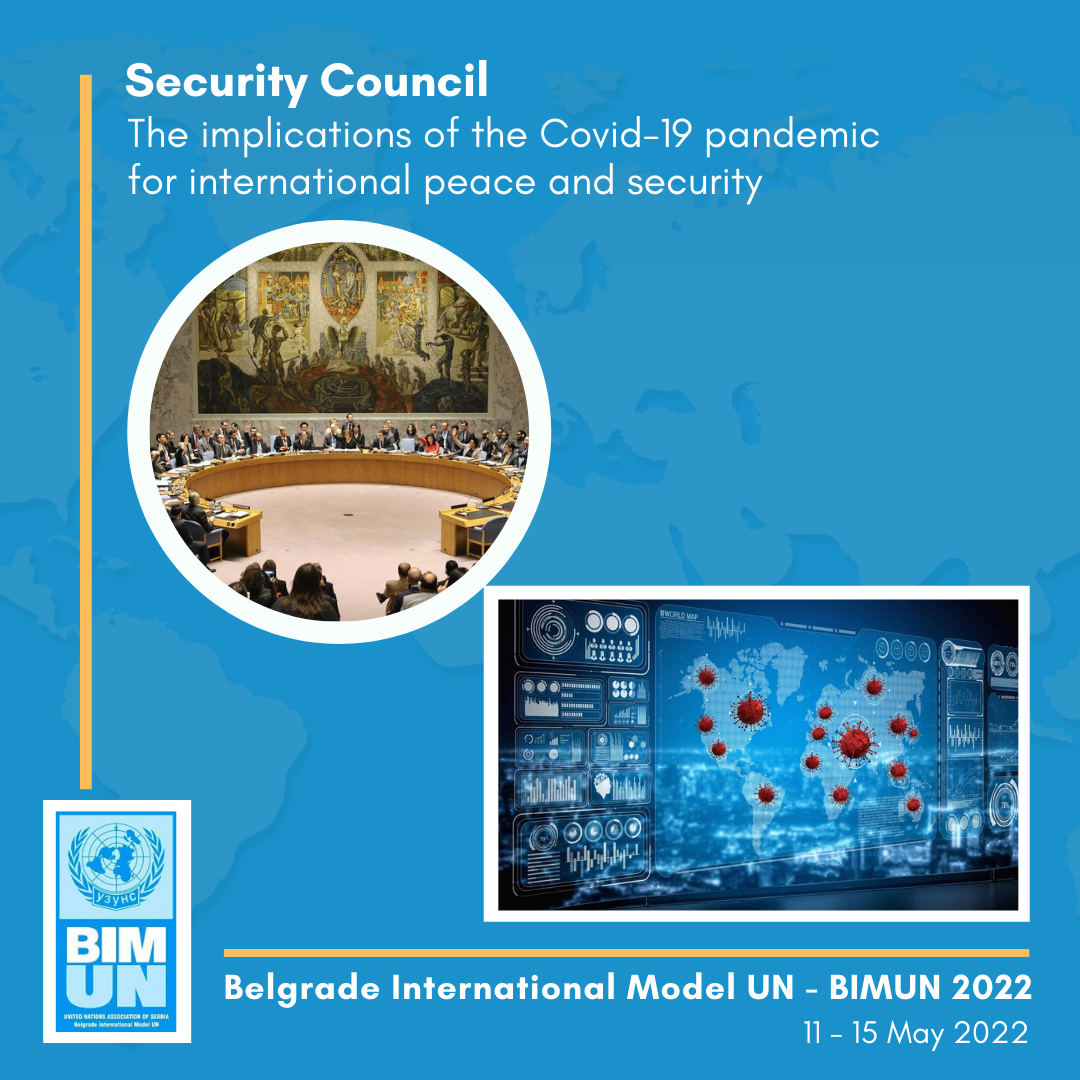Topic
| Security Council | Topic | Member states | Links and documents | Contact |
|---|
 The implications of the Covid-19 pandemic for international peace
The implications of the Covid-19 pandemic for international peace
and security
For almost two years now we have been living in a world of the global Covid-19 pandemic which has greatly affected all aspects of our lives. More than a health crisis, the implications of the pandemic are far-reaching and threaten global peace and security. There is an international sense of insecurity due to lockdowns and the restrictions to the movement of people and goods are leading to an economic recession.
The UN peace operations have also been affected – the troop rotations frozen and the contact they had with the locals minimized. The UN peacekeeping missions face a difficult task ahead of them in light of recent news that, due to the global recession, funding for these missions grows ever so smaller. Some concerns have also been voiced, recalling the horrors of the Nepali peacekeeping contingent introducing cholera to Haiti in 2010 resulting in a loss of nearly 10,000 lives and infection of almost 820,000 people.
It is important to note that the health crisis can also negatively affect international peace and security through its secondary impacts. Severe import restrictions, for example, pose a great threat to people who rely heavily on humanitarian aid. The rise in discrimination based on age, race or otherwise, has not only put several minorities at risk, but also had an adverse effect on the promotion of mutual tolerance, understanding and willingness to cooperate on a national, multi-national and international level.
Groups which have been particularly threatened by the covid pandemic are also those that are highly exposed or confined, such as prisoners and other detainees, asylum-seekers and refugees. Lockdowns, travel restrictions and border closures have led migrants, asylum-seekers and refugees to be stranded in places where the virus is more likely to spread, such as camps and detention facilities. In this regard, many countries in Africa have been particularly affected, as well as the Middle East. Covid-19 has also led to tensions between migrant groups and local communities, and in some cases, migrants have been blamed for spreading the virus, such as seen in Bangladesh, Indonesia, Kazakhstan and others. The United Nations also state that terrorist groups see the pandemic as an advantage. Security forces are focused on the pandemic, therefore making it easier for the terrorist groups to operate.
Uncertainty caused by the ever-changing situation as well as the lack of coordinated, structured response from the governments around the world has led to fear, anxiety and weariness among people and have served to lessen people’s trust in their governments. Measures that governments take to combat the pandemic often are not accepted by the people. Protests against lockdowns and restrictions happen frequently and they often turn from peaceful to violent. These situations, while on a national level, pose an undeniable threat on a larger, international scale - undermining the stability of countries which may lead to further instances of civil unrest, social tensions and a deterioration of the political and security climate. Also, diplomatic talks have been changed from meeting in-person to online meetings, making it harder to establish trust between diplomats.
One of the major risks for international peace and security is that countries have been accusing one another, implying or outright stating that the virus is a bioweapon. The Security Council clearly states in Resolution 1540 that “all States shall refrain from providing any form of support to non-State actors that attempt to develop, acquire, manufacture, possess, transport, transfer or use nuclear, chemical or biological weapons and their means of delivery, in particular for terrorist purposes.” When faced with accusations such as these, it is difficult for the diplomats to reach an understanding. The subject of bioweapons has also resulted in questions being raised about whether and how countries and supranational organizations would be able to deal with an emergence and use of one such weapon.
The severity of the global COVID-19 pandemic crisis was recognized early on by the UN Secretariat under the leadership of Secretary-General António Guterres. Utilizing its powerful and exhaustive “human security” analytical framework originally outlined in General Assembly Resolution 66/290 and based on four pillars of coordination, localization, multi-stakeholder partnerships and prevention, the UN developed a comprehensive response to the COVID-19 pandemic. This response recognizes this crisis as more than just a public health issue – it is a fundamentally human crisis that has laid bare severe and systemic inequalities across the world, inside every nation and among nations. Although faced with criticism at the start of the pandemic due to its initial silence and inability to meet in person and find ways and methods to enable remote meetings, the Security Council has produced two resolutions regarding the pandemic. Adopted on July 1, 2020, the United Nations Security Council Resolution 2532 demanded an immediate end to all armed conflicts on its agenda, to last for at least 90 consecutive days. This unprecedented "global ceasefire" was baked unanimously by the Security Council member states, as well as practically all member nations of the UN. Resolution 2565, adopted on February 26, 2021 called for increased global cooperation to facilitate COVID-19 vaccine access in conflict areas.
The United Nations Comprehensive Response to COVID-19 has focused on three point strategy: coordinating public health measures, addressing the devastating socioeconomic impacts of the crisis, and building more resilient social, political, and economic systems. The global ceasefire, even though relatively short, produced meaningful gains in protecting civilians and ensuring a united global front against COVID-19.
- What changes need to be made in order to improve international peace and security so the world can be prepared if the new pandemic happens?
- How can peacekeeping missions further adapt to the ongoing pandemic to ensure their effectiveness?
- What measures need to be taken in order to prevent bioterrorism?
